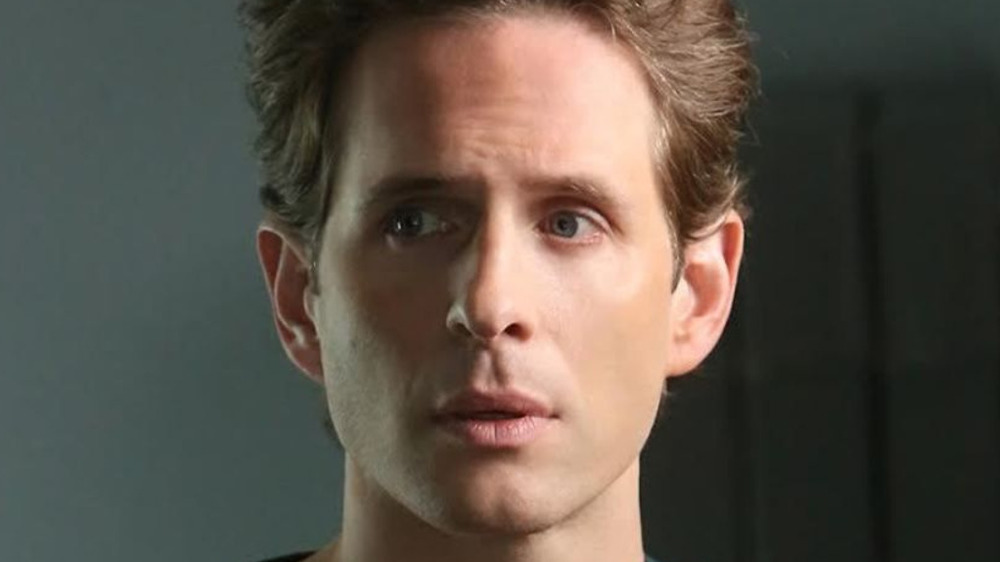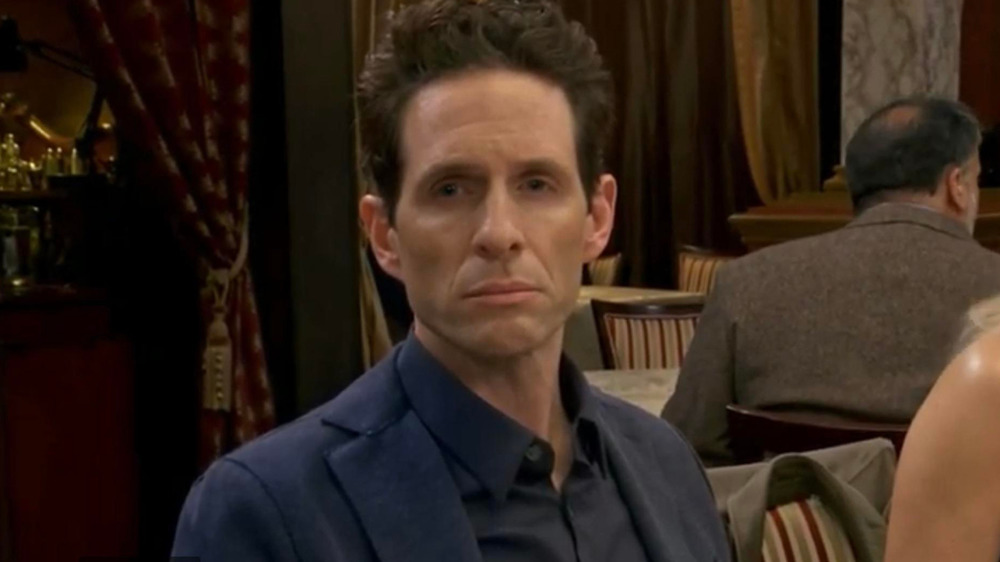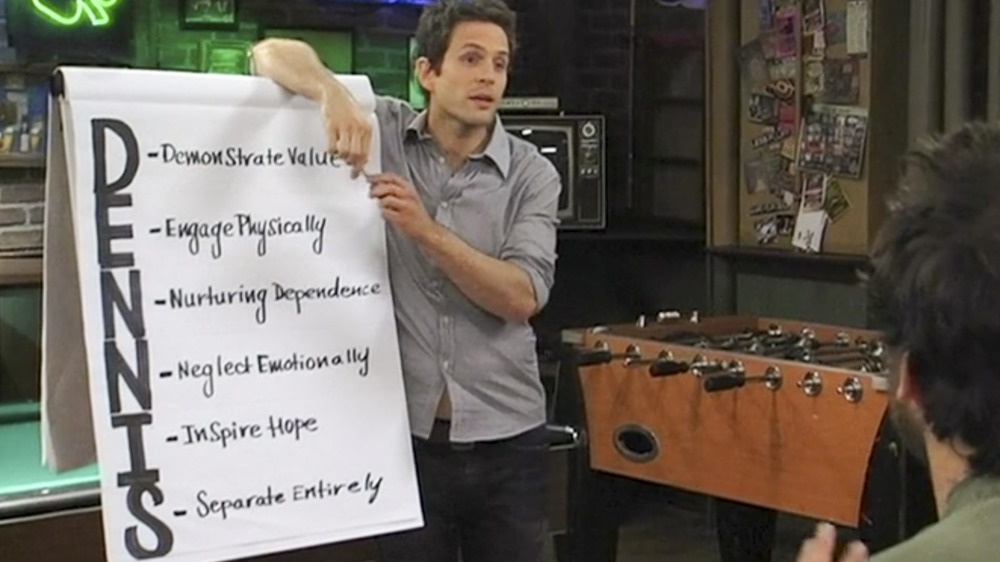Dennis From It's Always Sunny Has Some Concerning Traits Fans Shouldn't Ignore
In many ways, It's Always Sunny in Philadelphia is the antithesis of some of the most beloved sitcoms in television history. Unlike the bar that serves as the setting of Cheers, Paddy's Pub is a place where they don't know your name, don't care about your name, and probably don't like you, whether you're buying drinks or not. Unlike the shenanigans of the cast of Parks and Recreation, the gang's schemes on Sunny are generally for their own personal, selfish, and ill-gotten gains, rather than colorful misadventures for the greater good. It's Always Sunny in Philadelphia, conceptually, seems like an answer to the question "What if, instead of Jerry, Elaine, George, and Kramer, Seinfeld featured five characters who are genuinely bad people?"
But don't take our word for it; we asked an expert! Dr. John Paul Garrison, PsyD, MBA, C-PD — clinical and forensic psychologist as well as a certified personality disorder expert — offered Looper his thoughts on what might be wrong with the cast. "By any metric, the entire gang on It's Always Sunny is full of awful people. They lie, cheat, and steal whenever it suits them. While a compelling case could be made for any one of them to be the worst of the bunch, one of them has the most dangerous qualities. Dennis is the most pathological of the bunch and given his constellation of personality characteristics, may have the makeup of a serial killer."
It's not like we haven't had pretty much that exact though before, but we just don't have the educational background to give such a statement the professional weight it truly deserves. Dr. Garrison is here to walk us through "some of Dennis' more concerning traits."
Dennis has a long history of antisocial behavior
In a shocking revelation that a layperson could never have come up, Dr. Garrison posits that Dennis Reynolds (Glenn Howerton) has a long history of concerning behavior. "Whether it is dressing like a police officer to bully people or assaulting women, Dennis has a consistent history of antisocial and psychopathic behavior," Garrison said. And, while each member of the It's Always Sunny gang has engaged in antisocial behavior, "Dennis tends to engage in behavior that is just slightly more malevolent than the rest." As proof, Garrison cites the season 10 episode entitled "Ass Kickers United: Mac and Charlie Join a Cult," the installment in which Dennis manages to convince a cult member to kill themself. Of course, there's also the season 5 episode in which he sets a rival bar owner's yard on fire and vandalizes his house, or the time in season 8 when he tells a therapist how much he'd enjoy the thrill of being near enough to flip the switch when someone is being executed in the electric chair.
And, of course, there are the numerous times throughout the series in which it's implied that Dennis murdered someone; as Garrison notes, the antisocial behavior and murder can go hand-in-hand. "A long history of antisocial behavior is often observed in serial killers because Antisocial Personality Disorder (a diagnosis serial killers overwhelmingly have) is a lifelong issue. It is often observed at a young age and persists into adulthood. Dennis' relentless psychopathic behaviors are consistent with this type of history," Garrison adds.
But, of course, that's not all that's wrong with Dennis Reynolds.
Dennis has no empathy
In addition to his history of antisocial behavior, Dennis has no empathy. "Literally none," according to Garrison. You may recognize the above image as Dennis' stone-faced lack of reaction to his own father nearly choking to death in It's Always Sunny season 4. Garrison notes that, "on more than one episode, he thought it was funny that he was supposed to feel guilt." That's because, Garrison adds, Dennis lacks the capacity to comprehend the regretful emotion that is guilt. This is in line with a diagnosis of Antisocial Personality Disorder, an affliction Garrison had previously noted. Straight from the fifth edition of the Diagnostic and Statistical Manual of Mental Disorders' (DSM-V) criteria for ASPD is an impairment of interpersonal functioning predicated on empathy (via rinj.org): "Lack of concern for feelings, needs, or suffering of others; lack of remorse after hurting or mistreating another." That sounds like Dennis alright, perhaps like the time in season 1 when he slept with the Waitress (Mary Elizabeth Ellis) while trying to convince her to sleep with Charlie (Charlie Day) — which is not okay in its own right, of course — despite knowing his friend is in love with her.
In contrast with his friends Mac (Rob McElhenney) and Charlie, who, despite being idiots, appear "capable of a full range of emotion," Dennis showcases "a complete inability to feel deeply." According to Garrison, "this is often observed in serial killers due to underactive parts of the brain, such as the amygdala that mediates the connection between fear and memory." Garrison points to Dennis' father, Frank Reynolds (Danny DeVito), who he believes may also be pathological, "so it is entirely possible that Dennis inherited some of these neurologically based emotional deficiencies." It's worth noting that the DSM-V also qualifies "incapacity for mutually intimate relationships" under the criteria for ASPD.
Dennis is relentlessly manipulative
While it's hardly revelatory to point out that Dennis is "consistently manipulative to his closest friends and family," that doesn't make such a statement any less relevant to the conversation of Dennis' pathology. "He is also malevolent and manipulative towards women," Dr. Garrison adds, making it likely he's seen the "D.E.N.N.I.S. System" episode, though it's hardly the only episode of It's Always Sunny in Philadelphia in which he displays such behavior. Fans will recall Dennis' manipulative scheme for "seducing any woman and earning her undying love" from the show's fifth season. The acronym stands for Demonstrate value, Engage physically, Nurture dependence, Neglect emotionally, Inspire hope, and Separate entirely, and is one of many examples of Dennis' manipulations. Even his attempt to get the Waitress to sleep with Charlie, despite failing, constitutes clear manipulation.
"While 'sociopath' is not an actual psychiatric diagnosis, it is used to describe a psychopath who can form some attachments. Dennis is a sociopath in this sense," Garrison says, noting that Dennis is "deceptive, aggressive, and manipulative," all of which are straight out of the DSM-V. In fact, Garrison goes so far as to say that Dennis shares multiple traits with notorious serial killer Ted Bundy, noting the references to Dennis keeping a head in his freezer, which suggest —whether factual or not — that others on the show may also realize that Dennis is a dangerous sociopath.



